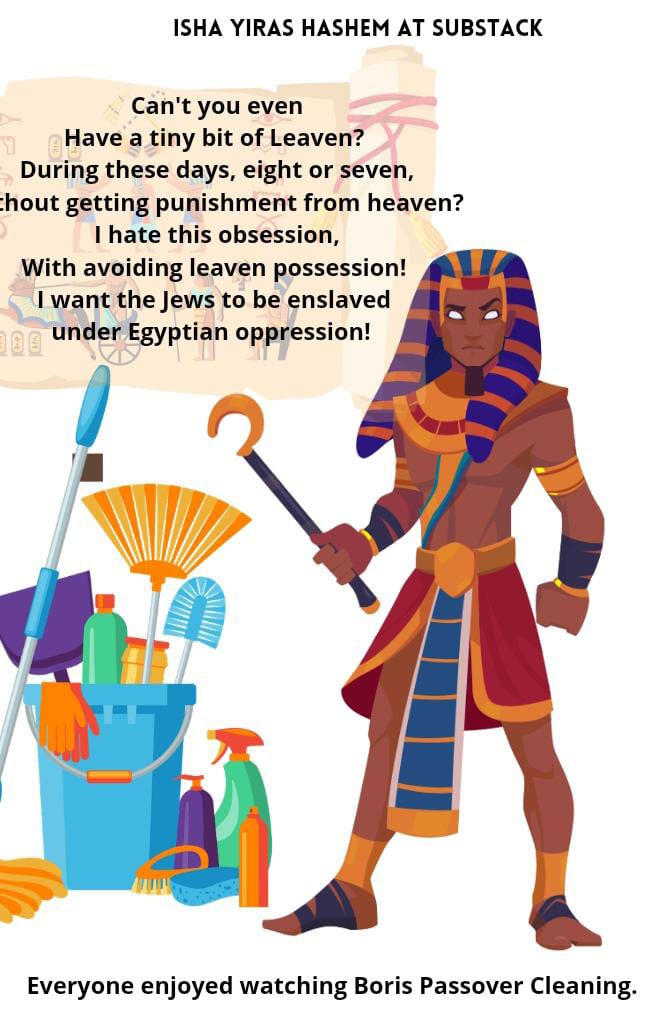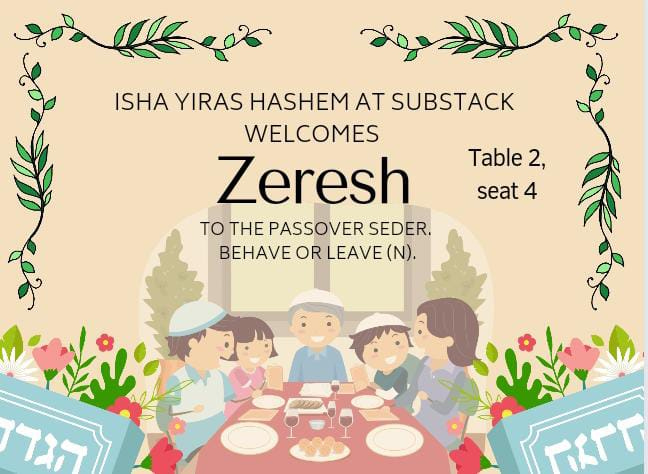Dear Readers,
Isha Yiras Hashem and family thank G-d for our new baby boy, who is keeping us very busy. As we welcome this new joy into our lives, I hope to continue writing about the universal spiritual dimension that connects all humanity. None of us live forever, yet we all have an enduring soul.
Please enjoy this thoroughly edited repost— in lieu of a new post for now—and welcome to our new readers!
Recap, for those new to Boris, who is indeed quite terrible, and yet rather educational:
Boris the Terrible harbors a deep disdain for Jewish traditions and their religious practices. Since he lives in Chelm, a predominantly Jewish, English-speaking town encircled by active volcanoes, Boris finds himself compelled to acquaint himself with these customs to maintain his grocery monopoly. His reluctant efforts to accommodate - and sabotage - the holiday needs of the community have previously lead to humorous and disastrous misadventures involving other Jewish holidays. Stay tuned to see how Boris navigates Passover! Please excuse the puns. They are also terrible.
As always, thanks to Rebbetzin Devorah Fastag, without whom this would be an empty shell, and to Debbie Rubinstein for help with the Spanish translation. Any remaining errors are mine alone.
With prayers for peace and redemption in the world,
Isha Yiras Hashem
Boris the Terrible did not like Jewish holidays. Rosh Hashanah gave him a head ache. Hanukkah kindled his anger and made his head spin. Boris fruitlessly tried to sabotage Tu Bishvat. And, being a descendant of Haman, the villain in the Purim story, Boris had lots of hang ups about Purim. He liked to criticize the Bible on Shavuot. But his deepest and most intense hatred was reserved for the most labor intensive holiday: Passover, which celebrates the Biblical Exodus.
Personally, Boris mourned the Exodus, and of course he absolutely loved the idea of the Jewish people as slaves in Egypt. Every year, when spring time came around, Boris was again annoyed at G-d, for causing the Jewish redemption.2
Boris liked to complain that, for a holiday that supposedly celebrated freedom, Passover was a lot of work. In fact, Passover was the most labor intensive holiday for everyone in the city of Chelm, especially Boris. He was forced to clean his store for Passover. How Boris hated cleaning! Alas, not a drop of “chametz” could touch the Passover products.3
This was because the Jewish customers could not have anything they called "chametz" on Passover. The Hebrew word "chametz" translated to "leaven" in English, the language spoken in Chelm. In a rare silver lining to Passover, Boris enjoyed correcting the people who visited his store. If someone said "chametz', Boris would yell, "That's LEAVEN to you!"
Whether it was called chametz or leaven, Boris had to clean it out of his store. He had no choice. So Boris decided to dress up as an ancient Egyptian taskmaster for the cleaning job, and pretend that the Exodus had never happened.
This provided some much needed comic relief for the Jews of Chelm, who took selfies with Boris at checkout. And videos. Especially when Boris started singing a song about how much he hated Passover.
(Boris had composed this ditty at an all night jam session, at Chelm University's pre-Passover open mike poetry slam.)
Boris, singing:
🎵🎶🎵🎶🎵🎶🎵🎶
Can't you even
Have a tiny bit of Leaven?
During these days, eight or seven,
Without getting punishment from heaven?
I hate this obsession,
With avoiding leaven possession!
I want the Jews to be enslaved
under Egyptian oppression!
🎶🎵🎶🎵🎶🎵🎶🎵
Sarah Tries To Educate Boris
Sarah, a middle school teacher with excellent hearing, overheard Boris singing this song.
Sarah: Don't you realize how serious the prohibition against chametz is? Haven't you read Isha Yiras Hashem's posts on housekeeping motivation, and how chametz represents the evil inclination?4 5
Boris: "That's LEAVEN to you!"
Sarah: Do you even know what leaven is?
Boris: Of course not. I'm not even sure if it rhymes with Heaven or Even, so I used both in my composition.6
Sarah: You should really check out Ohr Somayach's website. They say that leaven may be defined as "the resultant product of the fermentation of one of the five grains: wheat, barley, rye, spelt, and oats, after its combination with water."
Boris, irritably: Go eat matza. I hope you get a really big stomach ache.
Sarah, a bit puzzled: You really should subscribe to Isha Yiras Hashem on substack. There are even colorful pictures.
Sarah was a bit surprised at the intensity of his dislike for Passover.7 He didn't really deserve an explanation. So she left Boris to his Passover preparations.
Boris continued neatly stacking expensive boxes of Matzah in a corner. He thought about dropping bread crumbs in every box, but each box was individually double wrapped, with seals that could not be broken. Boris thought they did not trust him, because he did not know that it is traditional to be extremely careful about the food you eat on Passover. But his daughter, Zeresh, did know this. She was an expert on one particular Passover food.
Zeresh’s Specialty Bitter Herbs
A requirement of the Seder is eating bitter herbs. And Zeresh loved the idea of Jewish people eating bad tasting vegetables. Zeresh would find the bitterest herbs, and make sure they were the worst tasting for the Jews. The Jews knew they could count on Zeresh to sell them the most bitter herbs every year. It was a win-win!
Jews are not allowed to own even a single crumb of leaven on Passover. Many communities sell all leaven, or areas where leaven might possibly exist, to someone who is definitely not Jewish, and therefore allowed to own leaven during Passover. The Rabbi tried to sell the chametz to Boris. He explained to Boris that he was definitely not Jewish, which was ideal, because it would be terrible to accidentally sell the leaven to a Jewish person, who was forbidden to own it. Although he was happy not to be Jewish, Boris always refused, because he never wanted to help any Rabbi, ever.
Unbeknownst to Boris, Zeresh secretly contacted the Rabbi and offered to buy the leaven. On one condition. He would have to eat a teaspoon of her bitterest horseradish in the store. He agreed, and that became the custom in Chelm.
Zeresh Attends A Seder
Speaking of Zeresh, she felt that, in order to properly specialize in bitter herbs, she needed an invitation to a seder. Finally, a Jewish family agreed to host her. (They were new in town.) They warned her that the Passover Seder was long, and there would be no food for a long time, but she wasn't deterred.
Zeresh asked what the dress code would be. They said: business casual, on the festive side. So Zeresh borrowed her father's Passover Cleaning outfit, which he wore to his business, and showed up to the Seder, casually dressed like a Egyptian taskmaster, which made her feel more festive.
The Jewish family tried to explain that this wasn’t Purim: Passover isn't a dressing up holiday.
Zeresh, hatefully: How can I be happy on Passover without imagining that you Jews are my slaves and I'm an Egyptian taskmaster making you build my pyramids?
Hosting Family: Leave! And don't come back!
Zeresh: That's leaven to you! Ha ha! Do you think I was being serious? Please let me stay.
Hosting Family: One more joke and you're … leaven!
Zeresh followed along in the Haggadah, the book which tells the story of the Exodus and outlines the fifteen steps of the Passover Seder. Four cups of wine was no problem for Zeresh. She didn't mind dipping vegetables into salt water either, even though Zeresh was not into eating vegetables, except bitter vegetables. This was because she liked killing animals too much.8
Then they came to the Four Questions, which all boiled down into one question. How is this night different than all other nights? Zeresh was feeling bored.
Zeresh: Couldn't you come up with a more interesting question?
Jewish family: Like what?
Zeresh: Like, if you're in exile, why are you celebrating Passover? What's all this work worth to you?
Jewish family: Aha! You're the wicked son!
Zeresh: I'm a girl!
Jewish family: No, we are referring to the archetype of the four sons. There's the wise, the wicked, the simple one, and the one who doesn't even know how to ask. You would be the WICKED SON, and that's why you belong at our Seder!
Zeresh, charmed by the idea of being wicked: I identify as a girl. I would be the WICKED DAUGHTER. What happens to the wicked daughter?
Jewish family: It's wicked SON. And he gets his teeth knocked out.9 There's nothing about a wicked daughter.
Zeresh, who valued her teeth,10 did not interrupt again.
Nearing the end of the Seder, they explained that one doesn't eat or drink anything after the afikomen, which means dessert. For the Seder, dessert is the last piece of Matzah. Zeresh did not consider Matzah a dessert. She wanted ice cream for dessert.11
Zeresh, who was ready to leave anyway, interrupted the Seder to inform them that the first thing she would do when she came home would be eating some chametz ice cream sandwiches. They shrugged their shoulders and told her to leave(n). Zeresh left.
The family happened to be up to the part of the Seder where you open up the front door and call out into the night. The text says: “G-d should pour out His wrath on the people who do not know Him, and upon the kingdoms that do not call out in His name.” Zeresh, who didn't understand Hebrew, thought they were saying a fancy Passover good-bye especially for her. Thus, the family was able to finish the rest of their Seder in peace.
Postscript: Despite missing the afikomen, Zeresh got her just desserts. One of her sons decided to convert to Judaism, and became a famous scholar in Bnei Brak. Free subscription if you find the reference in the Haggadah.
https://ishayirashashem.substack.com/p/thought-he-would-live-forever
Thought he would live forever
(link to Arabic and Spanish) On Tuesday, January 20, 2022, I asked the Polish uber driver, who drove me and my son home from school, if he had ever heard of King Nebuchadnezzar. He frowned and said, "Excuse me?" I repeated, "Have you ever heard of Nebuchadnezzar?" He shook his head no.
Boris the Terrible is not real. Sources for the real elements of this post can generallybe found at Ohr Somayach. Ohr Somayach has a Passover section on its website. https://ohr.edu/holidays/pesach/
Happy to provide specific sources upon request. Comment or email ishayirashashem@gmail.com.
Chametz, or leavened bread, is forbidden during Passover. Learn more about why and explore other Passover traditions here: https://ohr.edu/holidays/pesach/
Housekeeping Motivation 1/2: Inspirational Passover Cleaning Schedule
For Spanish Speakers: Disfrute leyendo sobre la motivación para la limpieza y por qué limpiamos para Pesaj. La traducción al español está en los comentarios. ¡Reenviar a cualquiera que hable español que pueda disfrutar esto! Part 1: Isha Yiras Hashem is motivated to do some housekeeping, and creates an Inspirational Passover Cleaning Schedule.
https://ishayirashashem.substack.com/p/housekeeping-motivation-22-a-passover
I can never remember which it is, either.
Stop Baseless Hatred
Edit: Rebbetzin Devorah Fastag says we are co-authors on this one. Leer en Español The sages say that the First Temple was destroyed because of the sins of idolatry, immorality, and bloodshed. The Second Temple was destroyed because of baseless hatred.
https://ishayirashashem.substack.com/p/was-esau-as-nice-as-he-seems-12
The wicked son does not literally get his teeth knocked out. This is an expression that means that he is answered back sharply.
https://ishayirashashem.substack.com/p/there-really-are-alligators-everywhere
I also like ice cream for dessert. But at the Seder, afikomen is the dessert.








Wonderful story! Both informative and funny. I highly enjoyed reading it!
Congratulations!